- Home
- Steven Becker
Wood's Fury
Wood's Fury Read online
Wood’s Fury
A Mac Travis Adventure
Steven Becker
The White Marlin Press
Copyright © 2019 by Steven Becker
All rights reserved.
No part of this book may be reproduced in any form or by any electronic or mechanical means, including information storage and retrieval systems, without written permission from the author, except for the use of brief quotations in a book review.
This is a work of fiction. Names, characters, places, and incidents either are the products of the author’s imagination or are used fictitiously. Any resemblance to actual persons, living or dead, businesses, companies, events, or locales is entirely coincidental.
Get my starter library First Bite for Free!
when you sign up for my newsletter
http://eepurl.com/-obDj
First Bite contains the first book in each of Steven Becker's series:
Wood’s Reef
Pirate
Bonefish Blues
By joining you will receive one or two emails a month about what I’m doing and special offers.
Your contact information and privacy are important to me. I will not spam or share your email with anyone.
Wood’s Reef
"A riveting tale of intrigue and terrorism, Key West characters in their full glory! Fast paced and continually changing direction Mr Becker has me hooked on his skillful and adventurous tales from the Conch Republic!"
Pirate
"A gripping tale of pirate adventure off the coast of 19th Century Florida!"
Bonefish Blues"I just couldn't put this book down. A great plot filled with action. Steven Becker brings each character to life, allowing the reader to become immersed in the plot."
Get them now (http://eepurl.com/-obDj)
One
Hands on hips, Mac leaned backwards to relieve some of the stiffness in his sore back. He had just sunk the last screw into the last board of the dock that should have been built years ago. Of all the screws he’d ever set, either by hand or with the aid of a screw gun, this one might have been the most important. The lone pile, set by Wood back in the ‘80’s before he’d even bought the island, still stood proudly, but was no longer alone: It now anchored the corner of the dock.
Still working the tension from his body, he swore to himself that next time he would use a pad to protect his knees. When his muscles released, he stood back and with a critical eye checked his work, thinking it would pass even Wood’s inspection.
“It’s great, Mac,” Mel called from the beach. She stepped onto the walkway that extended over the waterline, connecting dock to land, and handed Mac a cold beer. “I’m not sure if Dad would be proud or mad,” she said with a smile.
Mac stepped back and took the beer, cooling his brow with the condensation on the ice-cold bottle. “Mad.”
With several miles of water between here and the closest road, the island had been Wood’s dream, and he had relished the privacy it brought. With only a narrow dredged channel leading to the old pile, to the undiscerning eye the island had appeared uninhabited. A closer examination might reveal the concrete tracks, poured into the small beach, used by Wood to pull his skiff through a well-camouflaged fence that concealed a clearing behind the mangrove-covered shoreline. The hundreds of islands littering the backcountry of the Florida Keys were filled with similar projects. Most were extremely primitive, dreams that were never finished, or storm ravished and abandoned.
Mac sipped the beer. “I’ll swim out and bring the boats in after I clean up.”
“This is good, Mac. Dad was into all this top-secret stuff, but now, with Google Earth or a drone, anyone who wants to find us could.”
And people had. After several recent adventures, the island was far from secret.
Mac glanced toward the shore. He knew Mel was right. The camouflage previously offered by the thick brush had been stripped bare by Hurricane Ruth a few months ago and the house was now clearly visible from the water. “Just takes some getting used to.” Her point made, Mel closed the gap between them and kissed him before turning and heading up the path to the house.
The dock was a necessary improvement, but was just one of a long list of changes since Mel had moved out to the island full-time. Adding the satellite internet connection had made her happy, but he wondered what would be next. While it seemed they were both past the age for kids, you never knew with Mel. Wood’s daughter had eschewed her upbringing here and, with the ink still fresh on her high school diploma, had run as fast as she could to a college in Virginia. It was like that with kids in the Keys; they either ran as far as they could, or rarely ventured to the next island.
Mel was one of the few who had come back, but it had taken time. After graduating law school, she worked for the ACLU, and rarely came home. Wood had been injured several years ago when a terrorist group found out that Mac had unearthed an old nuke. Along with Wood and Mac, she had been instrumental in stopping the terrorist’s plot to detonate the long-lost bomb. Stopping the explosion had cost Wood his life, but reunited her with Mac. Fed up with the ACLU, it hadn’t taken long after that for her to relocate back home. She was restless, though. Big Sugar had become her victim of late, and satellite internet made it palatable and possible for her to work from the island. Mac was happy when Mel had a cause, because without one he feared he would be next on her list.
He finished the beer and put the empty bottle in the recycle bin on the dock. The lack of trash service was about the only part of island life that Mac didn’t like. It was often an all-day project to bag, then load the trash and recycle aboard the boat, run into Marathon, off-load it into his old pickup, and take it to the transfer facility on Long Key. It wasn’t so much dealing with the trash as having to visit the mainland that bothered him.
Trufante’s girlfriend, Pamela, had called him an islomane. “There are people … who find islands somehow irresistible. The mere knowledge that they are on an island, a little world surrounded by the sea, fills them with an indescribable intoxication,” she had explained. There was another, more romantic, definition—that islomanies were the descendants of Atlantis. Mac didn’t buy that, but Pamela was right about his intoxication with island life. He had found that Pamela’s insights often bordered on the mystical, and after she had given his formerly anonymous boats names, he rarely disregarded her.
Marathon itself was an island, but its size and connecting bridges disqualified it as such, in Mac’s opinion. He preferred his own company—and Mel’s. With little overhead to worry about, he was free to fish and dive the rich waters here in the Keys. Seasonal catches, as well as his strings of lobster and stone crab traps, kept enough money in his pockets to satisfy him.
Already shirtless in the afternoon heat, he walked to the end of the pier, dove into the crystal clear water, and swam out to Ghost Runner. Climbing aboard the customized forty-two foot steel-hulled trawler, he went into the wheelhouse and started the engine. After idling up on the anchor, he hit the windlass switch. While he waited for the motor to pull the anchor from the muddy bottom, he realized how much easier the dock would make things. In the past, he would have to tie off to the solitary pile, set a stern anchor to prevent the boat from swinging when the tide changed, and wade to shore. Now, after docking, he simply tied the boat to the new cleats, and stepped up to the dock.
Mac repeated the process for Reef Runner, his twenty-two-foot center console, and smiled, feeling the deep satisfaction of having completed something on his own. But his happiness, was short-lived, as the sound of an outboard engine came across the water. With no buildings or big landmass to stop it, sound traveled a long way out here, and though the boat was not yet in sight, he could tell two things from the pitch of the engine: It wa
s coming toward him, and it was Trufante.
Jumping back onto the deck of the trawler, he checked to see if there was cold beer in the propane-powered refrigerator. Taking two of the six beers and stashing them in a nearby cabinet, he brought two bottles onto the deck and waited—laying the groundwork that this was going to be just a two-beer trip. Having the beer close at hand would also keep Trufante away from the house—and Mel. Often at odds though not enemies, their relationship was more like that of warring cousins in a dysfunctional family. In short, they had issues—mainly because of Trufante’s nose for trouble. Trouble that inevitably found Mac too
As it usually did, trouble came in fast and hard, and the boat was soon in sight. Mac set the beers down and walked to the end of the new dock to help tie off the boat. He didn’t need to look up to see if he was right about its identity. Every boat had its own signature, a combination of the sound of the engine and shape of the hull, and he recognized this as the twenty-four footer that Pamela recently had bought Trufante. It was a used boat, purchased when the couple had reconciled after being estranged for several months. Pamela had moved to Key West to “find herself,” but what she’d mostly found was what she needed was the Cajun. And as much as a hurricane can tear things apart, it can also reveal what really matters. Consequently, she and Trufante were back together.
The boat purchase had surprised many. No one had figured out where Pamela’s money came from. It was no secret that on the first of the month, her credit card was hot enough to burn you, and by the last week, cold enough to inflict frostbite.
Part of their reconciliation deal was that Trufante would have to work. Not that he was averse to it. He was actually a good deckhand when Mac needed help, but Mac worked only when it suited him, which wasn’t often enough to employ someone else full-time. The newly acquired boat had enabled Trufante to join Commander’s fleet of bait fishermen. Since then, Mac worked mainly alone or with Mel’s help when the fish were biting. Without Trufante and the black cloud of trouble that often followed him, the last few months had been peaceful—almost boring.
“Yo, Mac, look at you, dude,” Trufante said, smiling, his toothy, Cadillac grill gleaming in the sun. “Old Wood’d be rolling in his grave if he saw this.”
“Probably right there, but Mel’s happy.”
“And that’d be a darned good thing, then. Nice work.”
Mac grabbed the line and tied off the boat as Trufante took a long stride onto the new dock. “She’s a bit high, don’t you think?”
“Worried about those king tides and storms.”
“True that. If you listen to those global warming cats, y’all be underwater in a few years.”
“Well, they’ve been wrong before,” Mac said, always loathe to believe what he called “political science.” But even he had noticed changes, and whether man-made or not, they were real. He walked back to where he had set down the beers, reached down, and handed one to Trufante.
“What brings you out?” Mac asked, worrying about the visit. It was late in the month and that meant Trufante probably needed money.
“Bait bites been off with these fronts coming through. Thinking you might want to hit the tuna.”
Mac had heard the blackfin tuna were close, and biting. Though Trufante had a boat now, he had a few too many skeletons in his closet to qualify for a commercial fishing license. Mac drank slowly, gauging Trufante in an attempt to guess how desperate he was. The lanky Cajun appeared calm and his eyes were clear. That at least was a good start, but Mac hesitated. Things had been running on an even keel for a while, and he had to admit he was enjoying it.
“Be like old times,” Trufante said, finishing his beer. He tossed the bottle into the bin and shrugged.
Mac knew the signal and went to the trawler, where he retrieved the two beers from the refrigerator. “Last two.” He handed one to Trufante and twisted the cap off the other. Just as he brought he bottle to his lips, he heard footsteps coming down the path.
“Mac?” Mel called out.
Mac flinched, not out of worry for himself, but unsure how she would react to seeing Trufante.
“Hey, Tru,” she said, “How’s Pamela?”
Mac was surprised by her cordiality, and while Trufante started his update, he retrieved the other two beers in the refrigerator. Handing one to Mel, and the other to a grinning Trufante, he stepped back and listened to the island gossip. They drank and listened as Trufante recounted the coconut telegraph action of the past week.
“We’re about out of fish,” Mel said, when Trufante finished.
It was funny how a simple sentence, said without knowing the purpose of Trufante’s visit, decided Mac’s answer.
“We was talkin’ ‘bout hitting the blackfin. Heard the bites been hot,” Trufante said.
The Cajun’s mile-wide smile loomed large, knowing he had Mac hooked.
“We need the groceries, Mac,” Mel said, sealing his fate. The normally full chest freezer, installed alongside the ground-level shed so it would be close to the power generated by the island’s small solar array, had disappeared in Hurricane Ruth’s storm surge. The house had survived. Rebuilt by Mac after it had been firebombed by a rogue CIA agent, it was constructed on ten-foot concrete piles, just high enough to keep it dry, but everything below had been taken to sea.
“Weather’s looking good for a run to the hump tomorrow,” Trufante started. “Eight knots from the southeast. Good moon too.” The Marathon Hump was a hot spot for tuna. Twenty miles offshore, but inside the Gulf Stream current, it was out of reach in bad weather.
Aside from his knack for finding trouble, Trufante was not without skills. In addition to his ability to channel the weather gods, he had the eyesight of an eagle and the reflexes of a cat. On a fishing trip he was what Wood would have called “good help.”
“All right,” Mac conceded. “I’ll pick you up at the 33rd Street ramp at six. We can catch some bait and head offshore.”
“Right on,” Trufante said. He finished his beer, said goodbye to Mel, and headed back to his boat.
“Got some dinner about ready,” Mel said, stepping off the pier onto the thin strip of sand that made their beach.
“I’ll be up in a minute,” Mac said. He sat on the new dock and finished his beer, trying to figure out in advance how a simple fishing trip might go bad.
Two
Mac’s feet stayed dry as he stepped aboard Ghost Runner from the new dock. Loading the rods and supplies aboard was also considerably easier. He started the 800 horsepower CAT C18 engine and allowed it to warm up while he secured the gear. Removing the covers from the twin electronics displays, Mac realized how far he had come, technologically speaking. Until a few years ago, even his cell phone—when the battery was even charged—was never turned on. There were all kinds of ways to rationalize his change, but the easiest was that he caught more fish with the devices than without.
Fishermen were often labeled Luddites, but that was an inaccurate stereotype. Mac still remembered the paper depth-finder and Loran units that Wood had, at the time similar to the same technology that NASA used. The problem with marine electronics was that they developed so quickly; fishermen were hesitant to spend the money to upgrade, knowing what they bought would be obsolete as soon as it was out of the box.
Mac had vacillated when he refitted the boat last year. The new engine was a no-brainer, but he had agonized over the electronics. After spending the last twenty-five years on these waters, he knew how to navigate the dangerous shoals and narrow channels. Even with low light, like this morning, when the sun wasn’t high enough to paint the water in a palette of colors that illustrated both how deep the water was and the makeup of the bottom, his memory served as an able aid. Because of that, he had initially selected cheaper, bottom-of-the-line units. That was, until Mel stepped in. After a near-miss on a foggy morning with a tourist who shouldn’t have been out on the water at all, the need for radar was evident. When satellite internet was installed on the is
land and he saw how the newer units could upload and download data via Wi-Fi, he was sold.
His only regret was that now he relied on the instruments so much instead of simply trusting his instincts. But he’d learned his lesson after he challenged himself to outperform the digital gauges that showed real-time fuel consumption. Thinking he could match the efficiency dictated by the displays and run the engine by feel, much like the steel-driving man John Henry, he had failed. On a day like today, when he would travel close to a hundred miles, that digital feedback turned into real money.
With the boat loaded, he set his insulated mug in the cup holder and released the lines. Spinning the wheel, he backed away from the dock, and turned toward the channel. Though there were many more navigation aids today than back in Wood’s day, the backcountry of the Keys was still poorly marked. Sticks, pipes, and even a toilet seat used as markers were reminders of where the channels lay, but unless you had local knowledge the primitive aids to navigation were as dangerous as helpful.
After exiting the channel, Mac skirted the now-submerged rock that stood sentinel over the entrance, turned to starboard, and started toward Marathon. From this distance, the thirteen-mile-long island was just a thin line on the horizon. To the west, rising higher than the land, he could barely make out the highest span of the Seven Mile Bridge. Moser Channel, which passed underneath, was one of only three or four locations in the Keys where a tall boat could transit from the Gulf to the Atlantic.
Mac steered a serpentine course, avoiding several shoals and small mangrove-covered keys as he made his way toward open water. Once past the hazards, he pushed down on the throttle and waited until the steel hull came up on plane before backing down just a bit. With the help of the fuel gauge, he adjusted the RPMs and pointed the bow toward a radio tower just visible on the horizon.

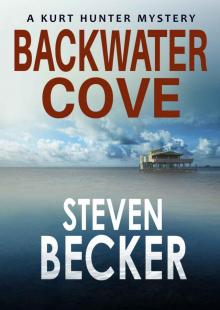 Backwater Cove
Backwater Cove Storm Surge: A Fast Paced International Adventure Thriller (Storm Thriller Series Book 3)
Storm Surge: A Fast Paced International Adventure Thriller (Storm Thriller Series Book 3)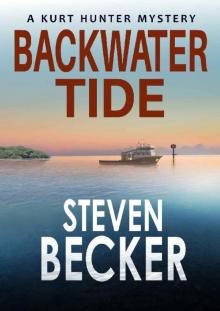 Backwater Tide
Backwater Tide Backwater Pass
Backwater Pass Backwater Flats
Backwater Flats Wood's Revenge
Wood's Revenge Haitian Gold
Haitian Gold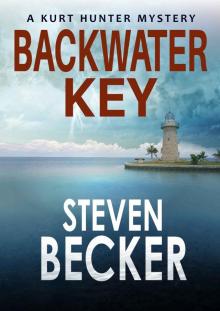 Backwater Key
Backwater Key Wood's Tempest
Wood's Tempest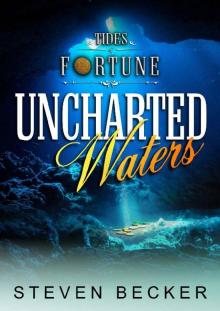 Uncharted Waters
Uncharted Waters Tuna Tango
Tuna Tango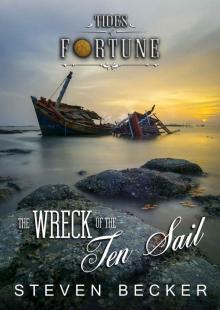 The Wreck of the Ten Sail
The Wreck of the Ten Sail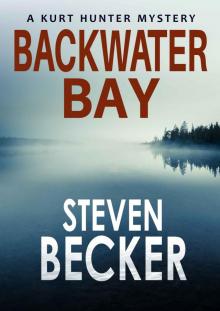 Backwater Bay (Kurt Hunter Mysteries Book 1)
Backwater Bay (Kurt Hunter Mysteries Book 1) Storm Clouds
Storm Clouds Wood's Wall
Wood's Wall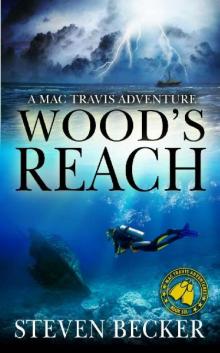 Wood's Reach
Wood's Reach Wood's Fury
Wood's Fury Storm Rising
Storm Rising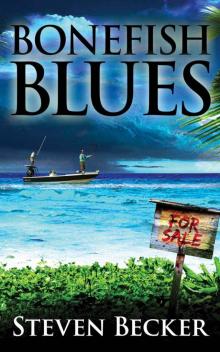 Bonefish Blues
Bonefish Blues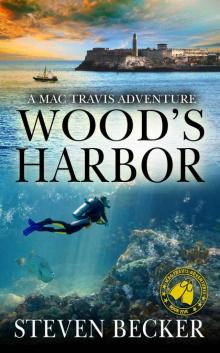 Wood's Harbor: Action & Sea Adventure in the Florida Keys (Mac Travis Adventures Book 5)
Wood's Harbor: Action & Sea Adventure in the Florida Keys (Mac Travis Adventures Book 5)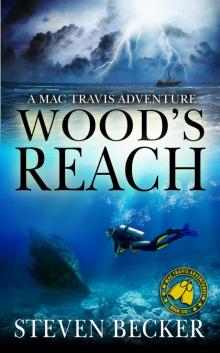 Wood's Reach: Action & Sea Adventure in the Florida Keys (Mac Travis Adventures Book 6)
Wood's Reach: Action & Sea Adventure in the Florida Keys (Mac Travis Adventures Book 6)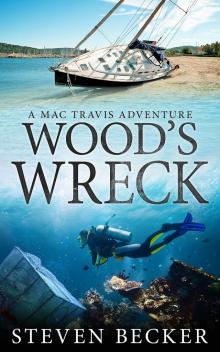 Wood's Wreck
Wood's Wreck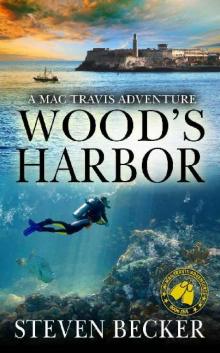 Wood's Harbor
Wood's Harbor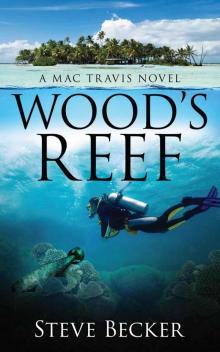 Wood's Reef
Wood's Reef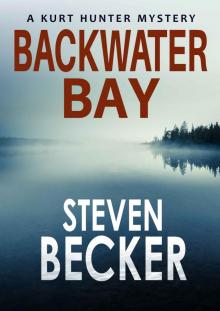 Backwater Bay
Backwater Bay